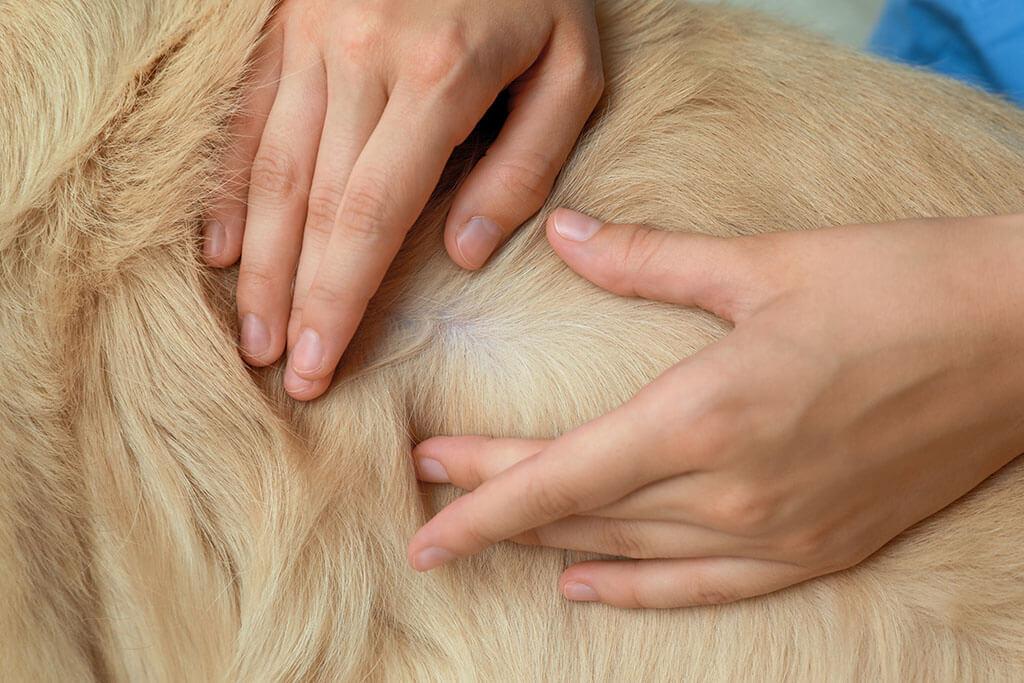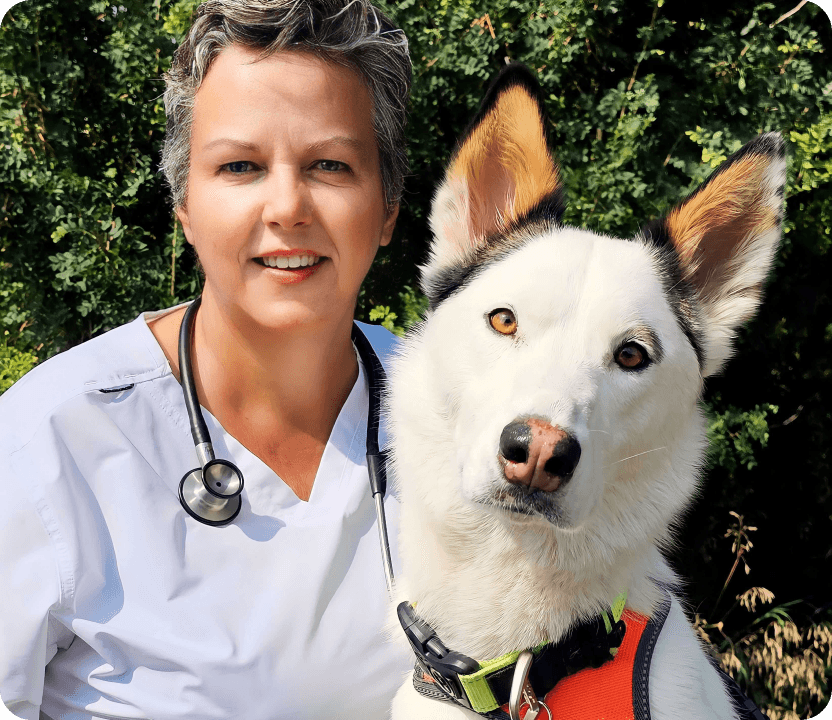Explore the hidden struggles of skin allergies in dogs with our latest dive into canine health. Our experts reveal symptoms, common causes, and what you can do to help.
- Home/
- Dog/
- Health & Wellness/
- Understanding Dog Skin Allergies: Causes and Solutions
Understanding Dog Skin Allergies: Causes and Solutions

As pet owners, we know how much happiness and friendship dogs bring into our lives. But just like us, dogs can have health issues, and one common problem is skin allergies.
These allergies, also called allergic dermatitis, can make dogs feel uncomfortable, itchy, and even cause pain. It’s important to understand what causes these allergies, what signs to look for, and how to treat them so that our dogs can stay happy and healthy.
In this article, we will learn about the impacts of dog skin allergies, what causes them, and what steps to take to help our dogs feel better.
Key facts:
- Skin allergies are the most common form of allergies in dogs.
- The three most common causes of dog skin allergies are food sensitivities, environmental triggers such as pollen and dust mites, and flea bites.
- Dog skin allergies lead to itchy and irritated skin, hair loss, skin rashes, hot spots, and ear and skin infections.
- Treating dog skin allergies requires a holistic approach, including avoiding or eliminating allergens, medication, skincare, and regular veterinary care.
- Supplements such as omega-3 and omega-6 fatty acids can help improve skin health and reduce allergy reaction symptoms in dogs.
Impacts of dog skin allergies
Skin allergies, or “allergic dermatitis”, are the most common form of allergies in dogs. Allergies can be caused by many different substances (allergens) in the dog’s environment and its food.
When a dog comes into contact with something they are allergic to, their immune system overreacts. This is called hypersensitivity. The symptoms of skin allergies in dogs occur because of this overreaction by the immune system.
These symptoms can make the dog feel very uncomfortable and even cause pain, which can greatly affect their daily life. These signs can also have a negative impact on the owner’s life. Some of the impacts on dogs include:
- Itchy and irritated skin: One of the most common signs of skin allergies in dogs is itching, which causes the dog to scratch, bite, or lick at affected areas.
- Hair loss: Hair loss can occur because of the dog’s excessive scratching, licking, and biting of the affected areas. The constant irritation and inflammation of the skin causes hair follicle damage and breakage, resulting in patches of hair loss.
- Focal skin rashes: Some dogs with allergies can get skin rashes that are localized to a specific part of their body, such as the ears, face, belly, armpit, and groin areas. These rashes often appear as red, inflamed, and itchy patches on the skin that may be raised or have small bumps.
- Hot spots: Hot spots can occur when a dog scratches aggressively, damaging the skin. The damage quickly progresses to become moist, painful, seeping sores known as hot spots.
- Secondary infections: Skin damage caused by constant itching, scratching, and licking can cause secondary yeast or bacterial infections.
- Ear infections: The sensitive skin lining the ear canals may also be affected, making the dog prone to chronic and recurrent ear infections.
The skin isn’t the only thing that can be affected by allergies. For instance, dogs with bad skin allergies might not want to play, walk, or run as much because they are uncomfortable and more worried about scratching their itches. Because of this, they may gain weight, which can lead to other health problems.
Also, allergy symptoms are often worse at night, leading to disrupted sleep for both the dog and its owner. This can further impact the dog’s energy levels and overall health.

Causes of dog skin allergies
A dog skin allergy can have several causes. The most common ones are food sensitivities, environmental triggers such as pollen and dust mites, and flea bites.
Dogs can also develop contact allergies to things they touch, such as grass, carpets, or household cleaners. The areas of the body that will be affected are those that are in direct contact with the item or substance that they are allergic to.
Other insects like mosquitoes, mites, and ticks can also cause skin reactions. Reactions to bites or infestations of these insects are typically localized, with itchy and red patches in the affected areas.
Genetics also play a role, and certain breeds may be more prone to skin allergies. Dog breeds that are more likely to develop allergies include Golden Retrievers, Labradors, Shih Tzus, Bulldogs, and Dachshunds, to name a few.
Allergies can become better or worse depending on the season. Dogs that have seasonal allergies might have worse signs during those times of the year when there are higher levels of pollen or mold.
Lastly, stress and anxiety can weaken a dog’s immune system, making them more susceptible to allergies and skin problems.
How to treat dog skin allergies
Dog skin allergy treatment requires a holistic approach to ease clinical signs, minimize allergen exposure, and improve overall skin health. Here’s a step-by-step outline for treating dog skin allergies:
- Consult a veterinarian: It’s important to visit a veterinarian to obtain a proper diagnosis and find out what’s causing the allergic reaction. Even if they can’t pinpoint the exact allergens involved, a veterinarian can provide a treatment plan to manage and reduce allergy signs.
- Allergen avoidance: Try to help your dog avoid things that might cause its allergies. If it’s environmental allergies, try not to spend too much time outdoors when there is increased pollen. Alternatively, more frequent rinsing or bathing can wash away allergens. Keep your living area clean to reduce dust mites with regular vacuuming. For food allergies, follow your veterinarian’s advice and give your dog a special diet that won’t trigger the allergies.
- Medications: Your veterinarian may prescribe medications to manage allergy symptoms. Commonly used medications include topical treatments such as medicated shampoos and creams, corticosteroids, allergy shots, and antihistamines.
- Supplements: Certain supplements can support skin health and reduce inflammation. For example, omega-3 and omega-6 fatty acids are commonly recommended for their anti-inflammatory properties and to promote a healthy coat and skin.
- Flea control: If flea allergy is identified as a trigger, strict flea control measures are needed. Use veterinarian-approved products to treat and prevent flea infestations. All dogs should have year-round flea protection.
- Skincare: Regularly bathe your dog with a mild, hypoallergenic shampoo to keep the skin clean and reduce allergen exposure. Avoid over-bathing, as it may strip the skin of natural oils. Wiping your dog’s paws off after walks will also reduce allergen exposure.
- Protective clothing: If your dog has contact allergies, consider using protective clothing such as doggie shirts or booties to reduce skin exposure.
- Environmental enrichment: Stress may worsen allergies. Regular walks and providing mental stimulation through toys and play can help reduce stress and anxiety in dogs.
- Monitor for secondary infections: Keep a close eye on your dog’s skin and seek veterinary treatment promptly if you notice signs of secondary bacterial or yeast infections.
- Regular follow-ups: Schedule regular follow-up veterinary visits to monitor your dog’s progress, adjust the treatment plan as needed, and make sure their skin condition is improving.
Each dog’s allergies are different, so the treatment plan should be made for their specific needs. That is why it’s essential to work closely with your veterinarian to manage and treat your dog’s skin allergies properly for the best results.
A final word on dog skin allergies
Dealing with dog skin allergies can be a challenge for dog owners. However, understanding the potential causes and knowing how to effectively manage and treat these conditions can greatly improve your dog’s quality of life.
If your dog has skin allergies, you need to work with the veterinarian, be diligent about at-home care, and take preventive measures to effectively manage the condition. It may take time and patience, but with the right care, you can help your dog live a happy, itch-free life.
Skin infections FAQs:
Will dog allergies go away on their own?
Dog allergies that are seasonal may go away once the seasons change and allergens such as pollen are gone. However, the allergies will return each year when the allergen returns. In other cases, the triggers are always present, and the allergy symptoms will not go away without proper management and veterinary care.
How do I know if my dog’s food is causing skin allergies?
Your veterinarian may be able to do food allergy testing to identify the specific allergen causing the reaction. In most cases, an elimination diet is recommended. This is where certain ingredients are removed from your dog’s diet to see if the symptoms improve. Once the allergen is identified, your veterinarian can help you find a suitable hypoallergenic or limited-ingredient diet that avoids the problem-causing ingredient.
What foods should dogs with skin allergies avoid?
It is not possible to say exactly what foods should be avoided without allergy testing or elimination diet trials. It is known that specific proteins such as chicken and beef are most commonly associated with food sensitivities in dogs, and elimination diets usually focus on removing one or both of these proteins first to see if the allergies improve.
Will Benadryl help dog skin allergies?
Diphenhydramine, also commonly known as Benadryl(r), is an antihistamine that works by blocking histamine, a chemical produced by the body during an allergic reaction. While antihistamines can help some dogs with mild allergy symptoms, in general, they are not very effective in dogs and do not treat the underlying allergy. You should never give this medication to dogs unless prescribed by a veterinarian.
What medications are used for dog allergies?
Your veterinarian may recommend or prescribe the following medications for treating allergies in your dog:
- Topical treatments: Medicated shampoos, sprays, and creams containing ingredients such as chlorhexidine or oatmeal can help soothe the skin and reduce irritation.
- Steroids: In severe cases, corticosteroids may be prescribed to quickly relieve inflammation and itching. However, long-term use of steroids should be avoided due to potential side effects.
- Immunotherapy: Allergen-specific immunotherapy involves giving the dog increasing doses of the allergen by injection or sublingual drops. This can desensitize the dog’s immune system to the allergens over time.
- Biological therapy: Biological therapy is a treatment that works like your dog’s own immune system. This medication uses engineered antibodies that are very similar to what the dog produces naturally. These antibodies neutralize the main protein in the dog’s body that causes itching.
- Antihistamines: Although these medications are not as effective for treating allergies in dogs as they are in people, they can help reduce itching and inflammation in some cases. Common antihistamines for dogs include diphenhydramine, cetirizine, and loratadine.
How often should I bathe my dog with skin allergies?
If your dog has mild skin allergies or allergies to pollen, dust, or grass, bathing them once every one or two weeks with a hypoallergenic shampoo can be helpful. This helps to rinse off allergens from their coat and skin. More severe cases with secondary yeast or bacterial infections may need to be bathed two to three times a week with an antifungal or antibacterial shampoo until their condition improves.
What dogs are most prone to skin allergies?
The following dog breeds have been identified as being most prone to skin allergies: Boston Terriers, Boxers, Cairn Terriers, Dalmatians, English Bulldogs, German Shepherds, Golden and Labrador Retrievers, Irish Setters, Lhasa Apsos, Miniature Schnauzers, Pitbull Terriers, Pugs, Scottish Terriers, Shih Tzus, Welsh Terriers, West Highland White Terriers, and Wirehair Fox Terriers.
Sources:
https://www.isvma.org/wp-content/uploads/2016/10/AtopicDermatitisPart1.pdf
https://www.merckvetmanual.com/dog-owners/skin-disorders-of-dogs/allergies-in-dogs
https://www.merckvetmanual.com/integumentary-system/atopic-dermatitis/canine-atopic-dermatitis
https://pubmed.ncbi.nlm.nih.gov/36842258/
https://pubmed.ncbi.nlm.nih.gov/34798876/
https://www.sciencedirect.com/science/article/abs/pii/S0195561618300925?via%3Dihub
https://www.zoetispetcare.com/blog/article/think-twice-steriods-dog-itch
 W
W





